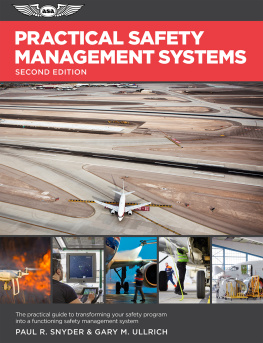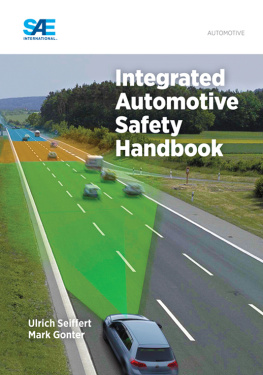NEW TOOLS, OLD TASKS
This book is dedicated to my loved ones: Linda, Maja Anneli, Torkel, mother, father, Hanne and Grete.
New Tools, Old Tasks
Safety Implications of New Technologies and Work Processes for Integrated Operations in the Petroleum Industry
TORGEIR K. HAAVIK
NTNU Social Research, Trondheim, Norway
ASHGATE
Torgeir K. Haavik 2013
All rights reserved. No part of this publication may be reproduced, stored in a retrieval system or transmitted in any form or by any means, electronic, mechanical, photocopying, recording or otherwise without the prior permission of the publisher.
Torgeir K. Haavik has asserted his right under the Copyright, Designs and Patents Act, 1988, to be identified as the author of this work.
Published by
Ashgate Publishing Limited
Wey Court East
Union Road
Farnham
Surrey, GU9 7PT
England
Ashgate Publishing Company
110 Cherry Street
Suite 3-1
Burlington, VT 05401-3818
USA
www.ashgate.com
British Library Cataloguing in Publication Data
A catalogue record for this book is available from the British Library
The Library of Congress has cataloged the printed edition as follows:
Haavik, Torgeir K.
New tools, old tasks : safety implications of new technologies and work processes for integrated operations in the petroleum industry / by Torgeir K. Haavik.
p. cm.
Includes bibliographical references and index.
ISBN 978-1-4094-5029-0 (hardback) -- ISBN 978-1-4094-5030-6 (ebook) -- ISBN 978-1-4724-0391-9 (epub) 1. Petroleum industry and trade--Safety measures. 2. Petroleum industry and trade--Management. 3. Offshore oil well drilling--Safety measures. 4. Petroleum industry and trade--Information technology. I. Title.
TN871.H23 2013
363.119--dc23
2012047428
ISBN: 978-1-4094-5029-0 (hbk)
ISBN: 978-1-4094-5030-6 (ebk-PDF)
ISBN: 978-1-4724-0391-9 (ebk-ePUB)
Contents
List of Figures
List of Tables
Preface
This book has been written in the intersection between different fields of interest: engineering, social sciences and the peculiarities of sociotechnical systems. Hence, the number of people with whom I have discussed the various topics of the book is considerable. Many thanks to all of them.
Petter Almklov is perhaps the single person who has influenced my thinking the most. Ever since we started our geological training more than 20 years ago, he has been a faithful provider of brilliant and idiosyncratic observations and explanations of trivial as well as exotic phenomena. If I could only see the patterns and the meaning in and behind the nonsensical as clearly as he does!
Vidar Heps has provided essential practical and professional support to the project from the early fieldwork to the analysing and writing process. Thanks for being an excellent discussion partner and motivator.
Studio Apertura, which has been my work place over the last five years, has been a stimulating and friendly community which has offered the mixture of professionalism and fun needed in any type of work. Many thanks to Per Morten Schiefloe, who made this study possible in the first place, and to all of my colleagues. Thanks also to NTNU Social Research for giving me the time I needed to finish the book.
The Ashgate editors have been very helpful in the whole process thank you very much. Many thanks also to Erik Hollnagel for searching his archives to provide digital versions of several of the figures used in the book.
Last I want to thank my wife Linda for being such a committed, critical and cool reviewer of my ideas and writings.
Some of the content in this book is based on material previously published in the following articles: Haavik, T. 2010. Making Drilling Operations Visible: The Role of Articulation Work for Organisational Safety. Cognition, Technology & Work, 12(4), 285295; Haavik, TK. 2011. Chasing Shared Understanding in Drilling Operations. Cognition, Technology & Work, 13(4), 281294; Haavik, TK. 2011. On Components and Relations in Sociotechnical Systems. Journal of Contingencies and Crisis Management, 19(2), 99109; Haavik, TK. 2012. Challenging Controversies: A Prospective Analysis of the Influence of New Technologies on the Safety of Offshore Drilling Operations. Journal of Contingencies and Crisis Management, 20(2), 90101. Material from the two first articles is used with kind permission from Springer Science+Business Media B.V. Material from the two last is used with kind permission from John Wiley and Sons.
Chapter 1
Introduction
This is a book about Integrated Operations (IO), and the impact of this operating regime on the safety of the petroleum industry. It is based on several months of fieldwork in the oil and gas industry in the period 20082009, including observation studies, interviews and document studies, where the goal was to understand how Integrated Operations may affect operational safety.
This worldwide change process in the petroleum industry has many other names, such as Field of the future, Smart fields and iField. In this book, these are seen as different notations for similar change processes. The generic principles for Integrated Operations are familiar to a range of domains, such as the nuclear, military and aviation industry; more use of information communication technology (ICT) will enable remote control, automation and better planning processes; all in all faster, better and safer decisions and operations.
Why do we need a book on this topic? Why not simply assume that the experiences from other industries will be valid also for the petroleum industry? While the latter may be the case, it will be on a very general level. I think the greatest risk in this type of research is the risk of over-generalising, of addressing visions and management philosophies at the cost of the nitty-gritty details of the dirty reality. The consequence may be tautological arguments that are not sufficiently rooted in the empirical field they address. For example, I believe one may find many similarities between the technologies and work processes involved in the collaborative work in an air traffic management location and an onshore operations support centre for offshore drilling operations. However, the physical natures of the work domains are very different, and one cannot expect that a generic technology or work process will make the same difference to those domains.
This book is therefore devoted to exploring the implications of defined IO tools for defined work domains. Any further generalisation should be a consequence of such insights, not produce those insights. Having said that, Integrated Operations may mean different things to different people, and I am not suggesting that the modus operandi in this book is the only one possible. It is, however, one very concrete contribution to the larger work of understanding the implications of Integrated Operations for the safety of the petroleum industry.
1.1 Background and Objective
Since Norwegian oil and gas exploration and production started more than 40 years ago, the petroleum industry has achieved a central position in the Norwegian industry, and society as a whole. In economic terms the historical development is often described as an adventure. The Norwegian economy is largely founded on the oil and gas industry. The ripple effect on general working life has been extensive. A whole range of industries supply the oil and gas sector with technologies, services and knowledge, and there is a significant mutual benefit between the petroleum industry and the academic and research sector and a range of industries that are not directly connected to the oil and gas industry (see e.g. Kindingstad, 2002; Schiefloe, 2009 for a more thorough elaboration of the history of the Norwegian oil industry).
Next page



